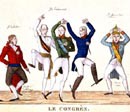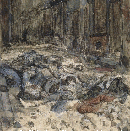The Congress of Vienna was a meeting of allies brought together by a common enemy, Napoleon
Yes, Napoleon essentially forced the great powers of Europe to join forces against him. But this alliance led to a different form of solidarity.
The aim of the Congress of Vienna was to rebuild a new sustainable European order. The great powers wanted to put an end to Napoleon's hegemony, as well as the eighteenth-century “system of war”, which traditionally had been based on an opposition between two military alliances (what was known as the “balance of power”). In the following years, there was a “system of peace” in Europe, which took the form of a single political unit under a “balance of negotiation”. It was a system of cooperation between major powers, rather than of competition. This unprecedented situation lasted more or less until the outbreak of the Crimean War in 1853.
The Congress was a vain party of the Ancien Regime monarchs who divided up Europe among themselves
 The history books left us with an idealized image. The festivities surrounding the Congress of Vienna were part of diplomatic tradition; it was customary to celebrate peace treaties. Nevertheless the Congress of Vienna did lead to a directorate of major powers (Russia, Austria, the United Kingdom, and Prussia), which governed the European order.
The history books left us with an idealized image. The festivities surrounding the Congress of Vienna were part of diplomatic tradition; it was customary to celebrate peace treaties. Nevertheless the Congress of Vienna did lead to a directorate of major powers (Russia, Austria, the United Kingdom, and Prussia), which governed the European order.
Besides, the monarchs were people of the nineteenth century; they were all more or less inspired by the Enlightenment. Yet they were also conservative in the sense that they rejected the radical interpretation of the Enlightenment – that of the French Revolution. In France, there was definitely a political fringe (the so-called ultra-royalists) that wanted a partial return to the Ancien Regime and in particular to absolute monarchy, but it was only one branch of the conservative faction.
The Congress of Vienna completely neglected the popular demands in the early nineteenth century
 That's largely right. The Congress of Vienna erased some states from the map and attributed additional territories to the great powers. Several peoples subjected to one or the other of the great powers failed to achieve independence. But the problem was much broader. There were revolutions even in independent countries such as Spain or France, as well as in overseas dependencies like Spanish America. All these disorders had one thing in common: the monarchs had refused to recognise the popular aspiration for political representation.
That's largely right. The Congress of Vienna erased some states from the map and attributed additional territories to the great powers. Several peoples subjected to one or the other of the great powers failed to achieve independence. But the problem was much broader. There were revolutions even in independent countries such as Spain or France, as well as in overseas dependencies like Spanish America. All these disorders had one thing in common: the monarchs had refused to recognise the popular aspiration for political representation.
Stella Ghervas is currently completing a book entitled Conquering Peace: From the Enlightenment to the European Union for Harvard University Press. Its goal is to examine how the reflection on war and peace crystallized around a political definition of Europe, over the longue durée. She is also working on a transnational history of the Black Sea Region, from the Russian expansion in the eighteenth century to the present day.


